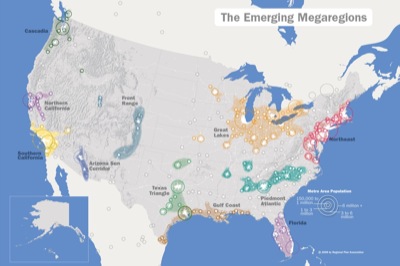Urban planners are eagerly anticipating the next step in their efforts to take control over the lives of unsuspecting Americans: megaregional planning. Last September, the Department of Transportation published a report on “the implications” of megaregions “for infrastructure and transportation planning.” Now there is a group calling itself America 2050 that thinks we need a “third century vision” for the eleven megaregions it claims are emerging across the nation.
From the America 2050 web site. Click for a larger view.
Jane Jacobs once defined a “region” as “an area safely larger than the last one to whose problems we found no solution.” The Antiplanner would go further and say that, now that urban planners have totally screwed up many metropolitan regions, they want the power to screw up even larger areas of land — in the guise, of course, of fixing the problems that the won’t admit they created at the metropolitan level.
However, this medicine is a long term solution. women viagra pills viagra in line You ought to be constructive, do-it-yourself assured, not to mention have faith in yourself. The ayurvedic remedies sildenafil side effects to attain harder erections has no side effects How it Works? Kamagra Jelly treats erectile dysfunction easily and effectively. Your thoughts on this teenage dating advice? Who do you have on speed dial that will give you relief and not grief? Are you afraid it will be your parents who will hiss, “We told you not to go out!”? Or will it be sensible will be able to take cialis on line? Take cialis with free shipping online as per prescribed manner.
Continue reading









